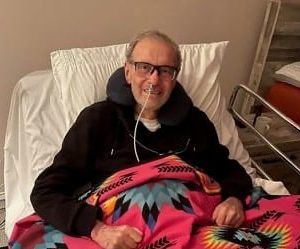- Could Your Grocery Store Meat Be Causing Recurring UTIs?
- Are You Making This Expensive Thermostat Error This Winter?
- Recognizing the Signs of Hypothyroidism
- 10 Strategies to Overcome Insomnia
- Could Artificial Sweeteners Be Aging the Brain Faster?
- Techniques for Soothing Your Nervous System
- Does the Water in Your House Smell Funny? Here’s Why
- Can a Daily Dose of Apple Cider Vinegar Actually Aid Weight Loss?
- 6 Health Beverages That Can Actually Spike Your Blood Sugar
- Treatment Options for Social Anxiety Disorder
Doctor Gets First U.S. Lung-Liver Transplant for Advanced Lung Cancer

Dr. Gary Gibbon didn’t have long to live.
A harsh cocktail of chemotherapy, radiation and immunotherapy for his advanced lung cancer had permanently destroyed his lungs and caused irreparable damage to his liver.
But Gibbon, a 69-year-old resident of Santa Monica, Calif., remains alive thanks to a groundbreaking, combined lung-liver transplant, according to his doctors at Northwestern Medicine in Chicago.
“I’ve been a physician for decades, and we tend to be conservative at times with our treatment plans, which is why the enormity of the science that went into this procedure is awe-inspiring to me,” Gibbon, a pulmonologist-allergist-immunologist, said in a Northwestern news release.
Gibbon calls the landmark surgery his “Triple L” — two lungs and a liver.
“To our knowledge, this is the first known case in the nation where a patient with advanced lung cancer has successfully received a combined lung-liver transplant,” said Dr. Ankit Bharat, chief of thoracic surgery and director of the Northwestern Medicine Canning Thoracic Institute. Bharat performed Gibbon’s lung transplant.
Gibbon was born in Cape Town, South Africa, but spent the last 33 years in private practice in Santa Monica before he fell ill.
In March 2023, Gibbon started coughing and losing weight. A chest X-ray revealed stage 3 lung cancer.
Doctors went after the cancer hard, subjecting Gibbon to brutal rounds of chemo, radiation and immunotherapy.
By mid-July, Gibbon was hospitalized with septic shock, pneumonia and multiple organ failure. His lungs were irreversibly scarred by the immunotherapy, and he would need them replaced.
“As a pulmonologist, I never imagined I’d ever need a lung transplant — let alone for lung cancer,” Gibbon said.
Northwestern University offers a first-of-its-kind clinical program called Double Lung Replacement and Multidisciplinary Care (DREAM), and Gibbon turned to doctors there to save his life.
While evaluating Gibbon, Northwestern doctors found the immunotherapy had also caused liver cirrhosis.
A four-hour medical flight delivered Gibbon to Chicago on Sept. 10, where he awaited donor organs in the ICU at Northwestern Memorial Hospital.
After twelve days on the transplant wait list, Gibbon received his new lungs and liver from the same donor during a 10-hour surgical procedure.
Surgeons implanted the new lungs first, while the donor liver was kept alive outside the body thanks to a machine that pumps warm, oxygenated and nutrient-enriched blood through the organ — a technology the docs call “liver in a box.”
The liver-sustaining technology gave Bharat sufficient time to meticulously remove Gibbon’s damaged lungs as well as all the cancer.
Bharat had to remove both cancer-ridden lungs, and then wash out the airways and the chest cavity before transplanting in the new lungs.
During this process, Gibbon was on full heart and lung bypass, Bharat said.
“These patients can have billions of cancer cells in the lungs, so we must be extremely meticulous to not let a single cell spill into the patient’s chest cavity or blood stream,” Bharat said. “We believe this technique can help reduce the risk of recurrence, which we learned through our experience with pioneering COVID-19 lung transplants.”
Six months after surgery, Gibbon has no signs of cancer in his body and does not require any further treatment, his doctors said.
Gibbon will remain in Chicago through the summer so his transplant team can closely monitor him.
“This DREAM program is new territory for transplantation and the fact that I could experience it and have a wonderful outcome makes me feel so blessed,” Gibbon said. “I wouldn’t be here today without Northwestern Medicine.”
More information
The American Cancer Society has more about lung cancer.
SOURCE: Northwestern University, news release, March 28, 2024
Source: HealthDay
Copyright © 2026 HealthDay. All rights reserved.










